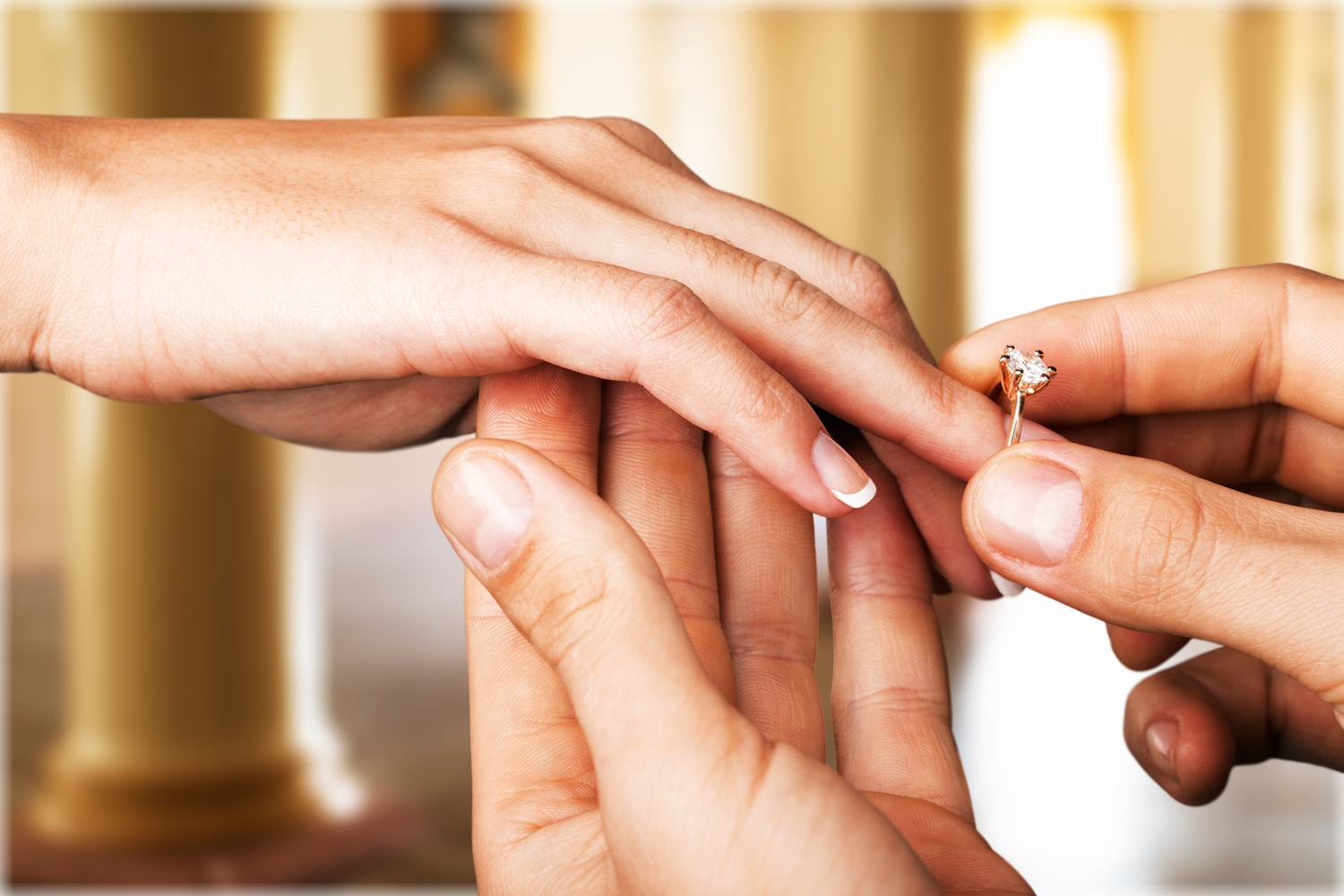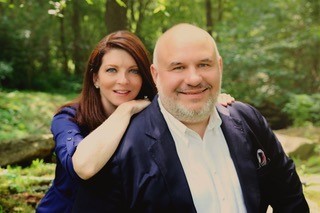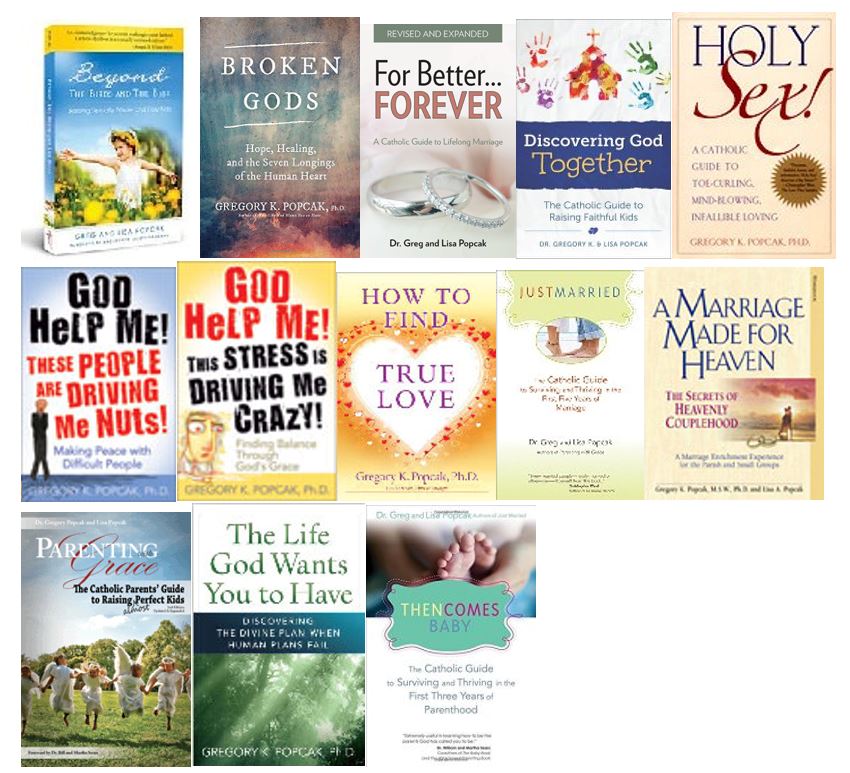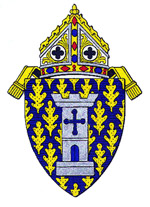We invite all families to join us at the annual Married Jubilee on September 7, 2025, at 2:30pm at St. Mary’s Cathedral in Ogdensburg. Bishop LaValley will be presiding. Whether you have been married for less than 1 year or over 50 years, we want to acknowledge your commitment and celebrate with you. Married couples that wish to receive a certificate signed by Bishop LaValley and have their names appear in the program should register no later than August 29th at Marriage Jubilee Registration (rcdony.org) or click on the button below. There will be a gathering with refreshments after the Mass. For more information, please contact Steve Tartaglia at 315-393-2920
The Catholic Church is vitally interested in the sanctity and success of marriage. The Church wants you to take time to reflect on the holiness of your vocation as a married couple and the importance of the step you are about to take. She wants you to understand that marriage is a way of life designed by God to include the very presence of Jesus Christ Himself. That is why the Church insists that couples who present themselves to have their marriage blessed in a sacramental way participate in a marriage preparation program.
The diocesan marriage preparation program “Pre-Cana” is held at various times in many of the deaneries. Marriage preparation programs such as sponsor couple programs are held in various parishes. Check with your parish priest or deacon to see if your parish offers a sponsor couple program.
What is a Pre-Cana Marriage Preparation Program?
Pre-Cana Marriage Preparation is for engaged couples planning to be married in the Catholic Church and referred by the priest or deacon. The choice of one day of preparation or two evenings of presentations and sharing enables you as a couple to have an opportunity to share honestly with each other your strengths and gifts that you will each bring to the marriage. You will also look at the challenges and opportunities that come with married life. The topics that will facilitate this discussion will be about family living, communication, finances, Christian sexuality, parenting, Natural Family Planning, and the Sacrament of Marriage.
Here are some excellent website resources on the topic of Marriage you may want to visit:
www.smartmarriages.com
www.americanvalues.org
www.foryourmarriage.org
When couples get engaged they move into the proximate stage of marriage preparation. The Church helps the couple build a foundation for marriage by providing a more specific preparation for the sacrament through participation in marriage preparation programs including relationship inventories such as FOCCUS and PREPARE, a Pre-nuptial investigation to help ensure that the couple is free to marry, and the Pre-Cana Program.
Learn more

The Engaged Couples Encounter is a weekend experience where an atmosphere is created in which each couple can concentrate exclusively on one another, free of the tensions, pressures and interruptions of the world. It is a very quiet weekend specifically designed to give the couples who are planning for marriage an opportunity to discuss honestly and intensively their prospective lives together -- their strengths, weaknesses, goals, attitudes about money, sex, children, family and their role in the Church and society in a face-to-face way.
For information on Engaged Encounter, check out the Engaged Encounter website at www.engagedencounter.org
1. Why does the church teach that marriage is a sacrament?
The sacraments make Christ present in our midst. Like the other sacraments, marriage is not just for the good of individuals, or the couple, but for the community as a whole. The Catholic Church teaches that marriage between two baptized persons is a sacrament. The Old Testament prophets saw the marriage of a man and woman as a symbol of the covenant relationship between God and his people. The permanent and exclusive union between husband and wife mirrors the mutual commitment between God and his people. The Letter to the Ephesians says that this union is a symbol of the relationship between Christ and the Church.
2. Do Catholics ever validly enter into non-sacramental marriages?
Yes. Marriages between Catholics and non-Christians, while they may still be valid in the eyes of the Church, are non-sacramental. With permission, a priest or deacon may witness such marriages.
3. What is the difference between a valid and an invalid Catholic marriage?
Just as individual states have certain requirements for civil marriage (e.g., a marriage license, blood tests), the Catholic Church also has requirements before Catholics can be considered validly married in the eyes of the Church. A valid Catholic marriage results from four elements: (1) the spouses are free to marry; (2) they freely exchange their consent; (3) in consenting to marry, they have the intention to marry for life, to be faithful to one another and be open to children; and (4) their consent is given in the presence of two witnesses and before a properly authorized Church minister. Exceptions to the last requirement must be approved by church authority.
4. If a Catholic wants to marry a non-Catholic, how can they assure that the marriage is recognized by the Church?
In addition to meeting the criteria for a valid Catholic marriage (see question #3), the Catholic must seek permission from the local bishop to marry a non-Catholic. If the person is a non-Catholic Christian, this permission is called a "permission to enter into a mixed marriage." If the person is a non-Christian, the permission is called a "dispensation from disparity of cult." Those helping to prepare the couple for marriage can assist with the permission process.
5. Why does a Catholic wedding have to take place in a church?
For Catholics, marriage is not just a social or family event, but a church event. For this reason, the Church prefers that marriages between Catholics, or between Catholics and other Christians, be celebrated in the parish church of one of the spouses. Only the local bishop can permit a marriage to be celebrated in another suitable place.
6. If a Catholic wishes to marry in a place outside the Catholic church, how can he or she be sure that the marriage is recognized by the Catholic Church as valid?
The local bishop can permit a wedding in another church, or in another suitable place, for a sufficient reason. For example, a Catholic seeks to marry a Baptist whose father is the pastor of the local Baptist church. The father wants to officiate at the wedding. In these circumstances, the bishop could permit the couple to marry in the Baptist church. The permission in these instances is called a "dispensation from canonical form."
7. If two Catholics or a Catholic and non-Catholic are married invalidly in the eyes of the church, what should they do about it?
They should approach their pastor to try to resolve the situation.
8. When a Catholic marries a non-Catholic, must the non-Catholic promise to raise the children in the Catholic faith?
The non-Catholic spouse does not have to promise to have the children raised Catholic. The Catholic spouse must promise to do all that he or she can to have the children baptized and raised in the Catholic faith.
9. Is it required that a wedding celebration have expensive flowers, clothes and other accompaniments?
The Rite of Marriage makes no reference to any of these cultural elements. The focus of the couple should be on the celebration of the sacrament. Pastors repeatedly point out that a couple do not have to postpone the celebration of the Sacrament of Marriage because they cannot afford such things.
10. How much does it cost to get married in the Catholic Church?
Dioceses often regulate the stipend, or offering to the church, that is customary on the occasion of a wedding. Depending on different areas, this might also include the fee for the organist and vocalist. In a situation of true financial difficulty, couples can come to an agreement with their pastors so that true financial hardship will never prevent a Catholic marriage from taking place.
11. What is a Nuptial Mass and when can a couple have one?
A Nuptial Mass is a Mass which includes the celebration of the sacrament of marriage. It has special readings and prayers suitable to the Sacrament of Marriage. The Sacrament of Marriage between two baptized Catholics should normally be celebrated within Mass.If the situation warrants it and the local bishop gives permission, a Nuptial Mass may be celebrated for a marriage between a Catholic and a baptized person who is not a Catholic, except that Communion is not given to the non-Catholic since the general law of the church does not allow it. In such instances, it is better to use the appropriate ritual for marriage outside Mass. This is always the case in a marriage between a baptized Catholic and a non-baptized person.
12. What should a couple do when they decide that they want to marry in the Catholic Church?
They should contact their parish as soon as possible and make an appointment to talk with the priest, deacon or staff person who is responsible for preparing couples for marriage. This person will explain the process of marriage preparation and the various programs that are offered.
13. Why does the church require engaged couples to participate in a marriage preparation program?
Marriage preparation offers couples the opportunity to develop a better understanding of Christian marriage; to evaluate and deepen their readiness to live married life; and to gain insights into themselves as individuals and as a couple.
It is especially effective in helping couples to deal with the challenges of the early years of marriage.
14. What kinds of marriage preparation programs does the church offer?
Depending on the diocese and the parish, several may be available. Programs include a weekend program with other couples, such as Catholic Engaged Encounter (www.engagedencounter.org), a series of sessions in large or small groups or meetings with an experienced married couple. Some programs may be offered in Spanish and other languages. Specific programs address particular circumstances, such as remarriage, children brought into the marriage and marriage to a non-Catholic. As part of their preparation, many couples complete a premarital inventory, such as FOCCUS, to identify issues for further discussion.
15. What key issues are covered in marriage preparation?
Marriage preparation programs help couples to understand the Christian and the human aspects of marriage. Typical topics include: the meaning of marriage as a sacrament; faith, prayer and the church; roles in marriage; communication and conflict resolution; children, parenthood and Natural Family Planning; finances; and family of origin.
16. Is there a cost for marriage preparation programs?
Most programs charge a modest fee to cover the cost of materials. Programs that require an overnight stay will include an additional cost for rooms and meals. Assistance is frequently available for couples who would otherwise be unable to participate.
17. Does the church offer any programs to help couples to improve their marriage?
Yes. Peer ministry for married couples is widespread. Many couples meet in parish-based small groups; ministries such as Teams of Our Lady, Couples for Christ, and Christian Family Movement also use the small group approach. The Marriage Enrichment Weekend Program (www.tmewpi.org) is offered in several states. Some parishes sponsor a retreat day or evening of reflection for married couples. Others offer a mentoring system that matches older couples with younger ones. Throughout the country, many couples participate in Marriage Encounter (www.wwme.org), which offers a weekend experience and ongoing community support.
18. What can a couple do if their marriage is in trouble?
Parish priests, deacons and other pastoral ministers are available to talk to couples and to refer them to counselors and programs that can assist them. Retrouvaille (Ree-tru-VEYE) (www.retrouvaille.org) is an effective program that helps to heal and renew marriages in serious trouble.
19. What is an annulment?
An annulment is a declaration by a tribunal (Catholic church court) that a marriage thought to be valid according to Church law actually fell short of at least one of the essential elements required for a binding union (see question #3). Unlike civil divorce, an annulment does not erase something that was already there, but rather it is a declaration that a valid marriage was never actually brought about on the wedding day. A declaration of nullity does not deny that a relationship ever existed between the couple, or that the spouses truly loved one another.
20. How can a couple married 20 years get an annulment?
The annulment process examines the events leading up to, and at the time of, the wedding ceremony, in an effort to determine whether what was required for a valid marriage was ever brought about. While a marriage of 20 years provides evidence that a couple had some capacity for a life-long commitment, the duration of their relationship in itself does not prove or negate the existence of the marriage bond.
21. If a marriage is annulled are the children from it considered illegitimate?
No. A declaration of nullity has no effect on the legitimacy of children, since the child's mother and father were presumed to be married at the time that the child was born.
22. Are annulments expensive?
As of June 1, 2015, there will be no fee charged to any party for matrimonial cases commenced in the Tribunal of the Diocese of Ogdensburg. This includes formal cases, Petrine Privilege Cases, Pauline Privilege Cases, Canonical Presumption of Death and Defect of Canonical Form Cases. Automatic Appeals required by canon law will also be processed without any cost to the parties. Tribunal costs will be met through the operating budget of the Tribunal, which is support by the diocesan assessment paid by parishes.However, any party appealing the decision of the diocesan tribunal or provincial appeals tribunal shall bear the cost of such appeal. Full payment of the appeal is to be made at the time the notice of appeal is filed.23. How long does it take to get an annulment?It usually takes 12 to 18 months to complete the entire process.
Retrouvaille
A weekend and follow-up sessions for stressed marriages put on by trained priest and married couples who have survived marital difficulties; not counseling or group therapy.
Q: What is Retrouvaille?
A: The word means “rediscover” for the program offers a chance to rediscover yourself, your spouse, and a loving marriage.
Q: How is this different from Marriage Encounter?
A: Marriage Encounter is designed to make a good marriage better while Retrouvaille is designed to bring a failing marriage back to life.
Q: What situations can benefit from Retrouvaille?
A: If you or someone you know is thinking of separation or divorce, or are already separated but want to try again, Retrouvaille might be able to help. While this is a Catholic program, we welcome couples of all faiths. Since Retrouvaille is designed to help marriages, it is not recommended for those who are unmarried and living together.
Q: How does Retrouvaille work?
A: Retrouvaille holds a live-in weekend for married couples during which a series of presentations is given to the group of couples attending. The presentations address issues that might be causing marital difficulty and emphasize a communication technique.
To learn more visit: www.retrouvaille.org
WHAT IS A MARRIAGE?
The Catholic Church understands marriage to be an enduring and exclusive partnership for the giving and receiving of love and the procreation and education of children.
For those who have been baptized a valid marriage is at the same time the sacrament of matrimony.
The Church believes that every valid, sacramental marriage that has been consummated is indissoluble. This is the law of God according to the evidence found in the Old Testament, the gospels of Matthew, Mark and Luke, the writings of St. Paul and thousands of years of Christian tradition.
Although not every marriage is a sacrament, each and every marriage (Catholic, Protestant, Jewish, non-believer, etc.) is presumed to be a valid marriage. The good of all concerned (spouses, children, in-laws, society, the Church, etc.) demands this presumption.
HOW, THEN, IS AN ANNULMENT POSSIBLE?
In every presumption the opposite may be true. If sufficient evidence can be shown that a particular marriage is invalid, the original presumption no longer holds.
Therefore, when it can be proved that a specific marriage is not valid or not a sacrament or not consummated there is a possibility that the Church will dissolve it or declare it to be invalid.
WHAT IS THE PURPOSE OF THE TRIBUNAL?
Church law calls for the existence of a tribunal in every diocese of the world. The Tribunal of the Catholic Church of Ogdensburg is under the direction of the Bishop of Ogdensburg and is supervised by his delegate, the Chief Judge. He, together with a staff of specially trained and experienced priests, religious and lay persons, offers assistance to persons who request that the Church study a marriage in order to determine whether or not there is any possibility of an annulment.
WHAT IS THIS STUDY OF A MARRIAGE?It is to determine whether or not there is a ground acceptable in Church law that would invalidated a marriage and whether or not this particular ground be proved “beyond a reasonable doubt” to have actually existed in the marriage being studied.
Click here for the Ogdensburg Diocesan Tribunal.
Engagement is not merely the time spent preparing for a wedding; it is a time of discernment for those planning a Christian marriage. It provides time to examine the meaning of responsible and mature love. With God's fidelity as a model of unconditional love, it is a time to consider your readiness to make that same commitment to another.
Engagement is a time of excitement and preparation for a particular and very important day. The importance of this day is based on the commitment of each of you to each other forever, before God and man. The purpose of marriage is to build a unique friendship and love between spouses. The richness of your relationship will have a positive impact not only on your lives but also on the lives of all around you and through this love you will be able to provide a nurturing environment for children to grow.

OUR SPEAKERS:
Dr. Greg and Lisa Popcak are the authors of more than 20 books that apply timeless Catholic wisdom and cutting-edge psychological insights to the challenges of marriage, family, and everyday life. Together, they are the founders of the Pastoral Solutions Institute, an internationally-recognized Catholic tele-counseling practice providing over 12,000 hours of counseling services each year to Catholics around the world. They were featured speakers at the 2015 World Meeting of Families in Philadelphia and are winners of the Couple to Couple League International’s Fr. Richard M. Hogan Award for their work promoting the Catholic vision of marriage and sexuality.
Dr. Greg Popcak is a Fellow of the American Association of Pastoral Counselors and the Chair of the Marriage and Family Studies Concentration in the Master of Pastoral Studies program at Holy Apostles College and Seminary. He also holds teaching positions on the psychology and graduate theology faculties at Franciscan University of Steubenville.
Lisa Popcak is a Certified Family Life Coach, a Lactation Consultant, and professional educator with specializations in learning styles and early childhood development, adoption, and attachment. They have been married 27 years and are the parents of three children. They are popular guests on many Catholic radio and television programs and their work has been featured in the LA Times, Washington Post, Ladies Home Journal, NPR, USA Radio Network, FoxNews, and many other outlets.

